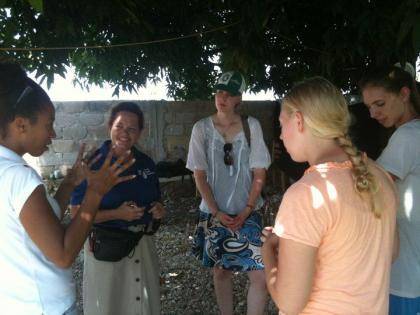
Though happily ensconced in a French studies graduate program at New York University, Claire Payton couldn't help looking south with envy.
For this budding scholar of Haiti, the grass truly appeared greener in Durham, where Duke's Haiti Lab stuck out among university programs focusing on that small island nation.
"If you studied Haiti, Duke was the coolest place," Payton said recently. "I just wanted to be part of it."
So she transferred to Duke and spent the last year embedded at the Haiti Lab, a three-year humanities experiment in bringing disparate backgrounds and expertise together. It became her scholarly home, a place where guest speakers dropped in and where professors and students of law and history and health and languages congregated.
"The conversation here isn't constrained to the classroom," Payton said. "The Haiti Lab is a place where separate worlds overlap and meet each other."
This summer, the lab closes its doors. Its work, however, will continue.
The lab was the first in a series of laboratory ventures created under the auspices of the Franklin Humanities Institute and housed at Smith Warehouse. The Greater Than Games Lab, born a year later, was a two-year experiment that's also shutting down this summer.
The Haiti Lab was thrown together somewhat hastily in September 2010 in response to the massive earthquake in Haiti that January. While the idea for some sort of humanities lab had bubbled for a while, administrators saw, in the months following the earthquake, an opportunity to harness myriad Duke strengths in history, languages, public health, law and other disciplines to work on important, global, current issues under one roof.
"We were already doing a bunch of this stuff," said Laurent Dubois, a professor of history and Romance Studies who co-directs the lab along with Deborah Jenson. "But the lab has really energized and crystallized things and had an exponential effect in terms of what we can do. It lets us have a more ambitious, broader take on things."
The timing was right. In a macabre way, the devastating earthquake raised the small, impoverished nation's global profile significantly.
In creating a lab, Duke made its Haiti expertise more formal. It created Haiti Headquarters, a place for students to meet, a place for ideas to pollinate. And its very existence addressed questions from some corners about the importance of this tiny country.
"In many places you'd be constantly explaining to people why it's important to study Haiti," Dubois said. "Just taking that out of the equation is a good thing."
Students passing through the lab routinely visited Haiti to work on issues of global health or language or culture. Payton spent time there interviewing and videotaping people taking part in religious ceremonies for a lab project, an experience she wouldn't have had if she only studies Haiti through traditional college courses.
"I can't think of a class structure that would have facilitated that," she said.
The lab helped raise the profile of Creole, the native tongue of Haiti now offered at Duke and accepted for the university's foreign language requirement. This spring, the lab capped off its three-year run with a conference that attracted a number of top scholars, government workers and business experts, including a former Haitian prime minister.
Though it'll no longer have a home at Smith Warehouse, the lab will carry on through several ongoing projects that have already secured grant funding, Dubois said.
GAMING EDUCATION
Like those in the Haiti Lab, the faculty and students at Greater Than Games found the lab setting to their liking. It brought in people specializing in computer science, information systems, classics, art, literature, English and other fields to build games with virtual and real-world components.
One group made an alternate reality game based on the stock market crash. Another used geo-mapping and 3D modeling to create an iPad app offering both a historical and contemporary view of Venice, Italy.
The lab setting made collaboration routine and also allowed faculty to run group independent studies, which would not have worked in a regular class setting, said Katherine Hayles, a literature professor and one of the lab's three co-directors along with Victoria Szabo and Tim Lenoir.
"The setting liberates the creative energies of students and the teachers," Hayles said. "Students feed off each other in a way that is rare in a traditional classroom. It's more collaborative, more creative and capable of going in surprising directions."